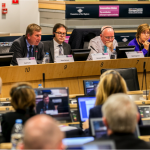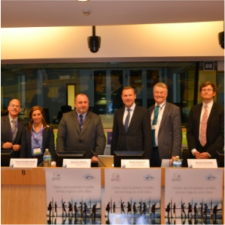On 27 November 2013, the Committee of the Regions organized a conference on “Innovation Union: The contribution of the Regions and cities“. It was the final in a series of seven conferences about the Europe 2020 flagship initiatives. The aim of the conference was to bring together key representatives of EU institutions, Member States and regions to take stock of the implementation of the flagship initiative at regional level. Accompanied by an exhibition of good practice from Europe’s regions and cities, the event focused on four aspects:
- Smart specialization strategies;
- Innovation, enterprise and jobs;
- Networking across borders;
- Open Innovation 2.0.
Based on a broad concept of innovation and over 30 activities, the Innovation Union flagship initiative commits the EU to increase investment in research to 3% of GDP by 2020. Studies indicate that such investment could create 3.7 million jobs by 2025. Today, only one in ten regions in the EU spends more than 3% of their GDP on research and these 27 regions together account already for over 40% of the total investment in innovation. Most of these leading regions have considerable expertise, capacities and budgets and follow a “smart specialization” approach to integrated regional development and the management of economic change and recovery. Moreover, between 2014 and 2020 “smart specialization strategies” will be a priority for all regions under the European Structural and Investment Funds, accompanied by the new “Horizon 2020” programme and other initiatives.
As part of the Innovation Union conference, a networking lunch was organized to allow participants to meet with experts and discuss issues with each other, together with facilitators from ERRIN, ENoLL, ELIG and the European Commission. The networking lunch provided input for the afternoon’s four thematic sessions
Diverse key messages and conclusions were formulated during the various plenary and parallel sessions, as well as the networking lunch. The final proceedings can be downloaded here:summary-proceedings-innovation-union
The conclusions of the conference will feed into the Committee of the Regions’ mid-term assessment of the Europe 2020 strategy, which will be presented on the occasion of the 6th European Summit of Regions and Cities on 7 and 8 March 2014 in Athens.
More information, including background material and the conference presentations, is available at: http://cor.europa.eu/en/events/Pages/eu2020-innovation-union.aspx
The conference video can be seen at: http://www.youtube.com/watch?v=U_HShylsoQc&feature=youtu.be



